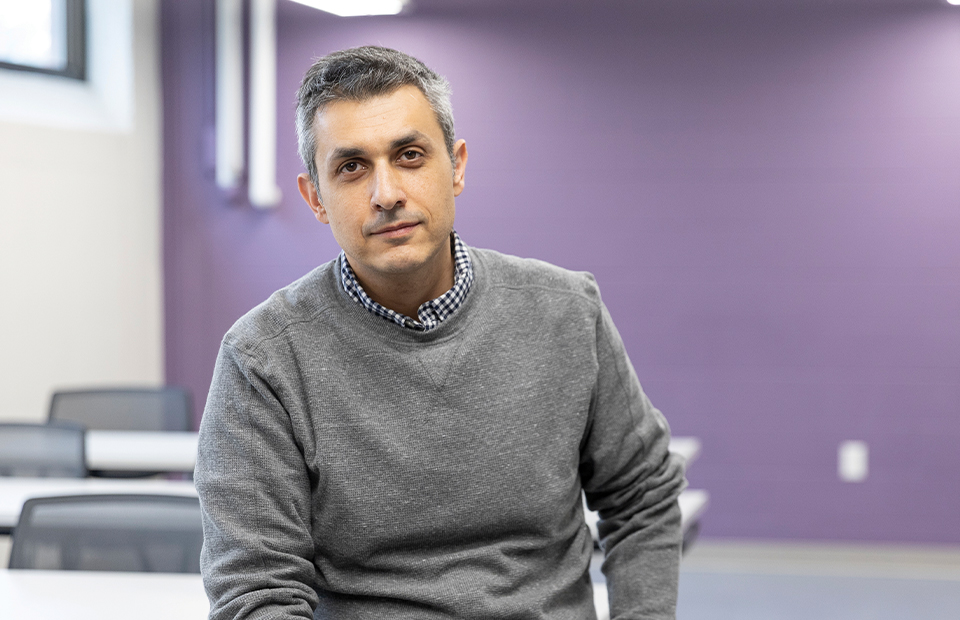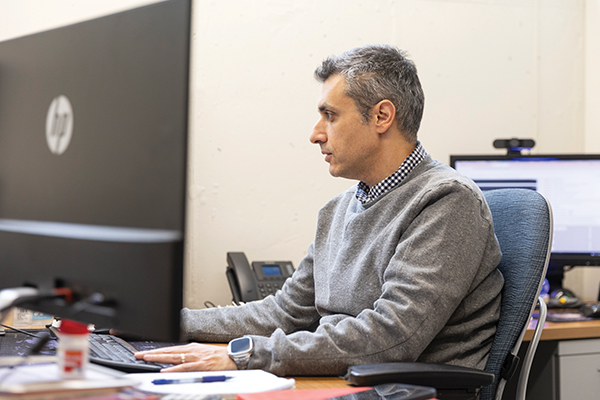In the Spotlight: Marwan Gebran
By Ashley Chaveriat ’25

What drew you to Saint Mary’s?
I am originally from Lebanon, completed the majority of my graduate education in France, and even worked in Spain. I went back to Lebanon to promote astronomy for 10 years, teaching at Notre Dame University-Louaize in Lebanon. When I decided to search for a different position, I looked at colleges and universities with the same mission and values. I was raised in a Catholic family and taught by Jesuits throughout my education, so I wanted to give this opportunity to my children. When you come from another country, you want to go somewhere secure, close to yourself, and where you are used to. The Catholic education, culture, and way of living was the main thing that I was attracted to at Saint Mary’s. I have now been here for four years.
How did you decide to teach physics and astronomy?
Astronomy was the only passion I had when I was younger. The philosophical questions intrigued me. “Where are we, why are we here, where are we going?” I started to relate more and more to science in the academic world. Linking these philosophical questions to our daily lives makes you choose between the small scale of quantum mechanics or the large scale of astronomy. I was more attracted to the skies, to the large scale. I started to enjoy physics and mathematics and began to seek more answers to my questions.
What is your classroom dynamic?
I teach a variety of courses and the dynamic is extremely interactive. I am a person who gets bored fast so I do my best through a variety of teaching techniques to make sure my students are not bored. When I see someone who hadn’t previously been interested in astronomy become passionate about it—when they see how astronomy can join all of the fields together—it is always special. It is a field of science that compiles all sciences like math, physics, chemistry, biology, even philosophy. It’s everything. Astronomy helps you understand that the more you know, the less you know. It is a slow-paced science in comparison to other fields. In astronomy, you cannot go to the star, take a sample, and come back. It takes time to conclude things to ensure you are correct, so it is a pleasure of mine to see students learn and become curious. You can see in their faces that learning makes them happier.
How would you describe your mentoring style?
In classes, it is something gradual and requires preparation. For physics students conducting research, I meet with them weekly, but give them autonomy because that’s the point of research. I supervise from afar, and my mentoring style has shown that most of my research students have been able to publish several papers. I also help them improve their research skills, and make sure they find their own research interesting.
What keeps you energized outside of the classroom?
I am motivated by many things, but I have two passions: artificial intelligence and video gaming. I research AI and do that on a daily basis, like work programming. I like to take time for myself with video gaming.

Where does AI fit into your work?
Since 2014, my mindset has changed from pure theoretical astrophysics to application of artificial intelligence in astrophysics, physics, and everyday life. I have been working in AI on all levels, not just in astronomy, but in the detection of bats in caves, a project with a colleague and friend of mine, or material properties with scientists at Notre Dame, or prediction of time for dog adoption in Saint Joseph county (a project with physics and applied mathematics students). I like the link of AI with academia.
You have a new book on the subject. Tell us about it.
Yes! Neural Networks in the Physical Sciences has been published! I co-wrote with (former Saint Mary’s physics colleague) Ian Bentley. Neural Networks introduces how AI and neural networks are used in science—chemistry, physics, astronomy, all sciences, actually. It is a pedagogical book with the goal to help undergraduate and graduate students learn more about AI and understand the mathematical concept behind it.
If you could travel anywhere in the world, where would you go?
I would love to go to Japan. I have never been, but I would love to learn the language and discover their culture. Perhaps I could work there for a couple of months to experience something new. Traveling is something I really enjoy because it is very enriching to discover different cultures. ‖

